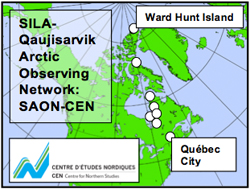Université Laval
Located in Québec City, Université Laval boasts a tradition for academic excellence and benefits from a well established infrastructure for Arctic research. Over the past 50 years, UL scientists have developed a diversity of expertise in northern research that is unmatched elsewhere in Canada and abroad. The Takuvik program builds on this human capital and available infrastructure to improve our understanding of the changing Arctic and our ability to manage it.
Québec-Océan
Québec-Océan mobilizes the resources and the creativity of Québec researchers to develop excellence in oceanographic research and training, pooling scientific equipment, technical expertise, and intellectual and financial resources from its members. Québec-Océan is pursuing its ambitious program on the function and integrity of Arctic and subarctic marine ecosystems of ice-covered seas under climate change.
Centre d'études nordiques (CEN: Centre for Northern Studies)
CEN is one of North America's leading research centres of excellence for the study
of high latitude climate, landscapes, aquatic environments, vegetation and wildlife. It focuses on three research themes: (1) structure and function of geosystems and ecosystems across the ecozones of eastern Canada; (2) evolution of these systems in the context of climate change and accelerated development; (3) vulnerability and risks associated with environmental change and adaptation strategies. Takuvik collaborators have access to the array of CEN's Nothern research stations.
Sentinel North
Funded by the Canada First Research Excellence Fund, the Sentinel North Strategy allows Université Laval to draw on over a half-century of northern and optics/photonics research to develop innovative new technology, train the next generation of transdisciplinary researchers and improve our understanding of the northern environment and its impact on human beings and their health.
Institut Nordique du Québec (INQ)
The INQ's vision reflects its partners' desire and determination to develop a sustainable North based on a foundation of knowledge. To integrate scientific knowledge with that of local communities, including Aboriginal knowledge, and partner with the public and private sectors to develop the Canadian Arctic and Northern Quebec for future generations, providing clean energy, healthy ecosystems, viable infrastructures, economic prosperity, vibrant cultures, and adapted education and healthcare systems.
Centre interuniversitaire d'études et de recherches autochtones (CIéRA)
CIéRA collaborators study Native, northern, and circumpolar issues. Its research program comprises four major axes: historico-cultural, socio-economic, politico-legal and education and training in an intercultural environment.
ArcticNet
ArcticNet is a network centre of excellence, based at Université Laval, that brings together scientists and managers in the fields natural, health and social sciences with their partners from Inuit organizations, northern communities, federal and provincial agencies and the private sector to study of the impacts of climate change and modernization in the coastal Canadian Arctic. Over 110 ArcticNet scientists from 27 Canadian universities and 5 Federal departments collaborate with research teams from around the world, spearheading the on-going revitalization of Canada's scientific role in the Arctic.
Space, infrastructure, labs, libraries, databases
Université Laval supports a broad spectrum of laboratories for advanced environmental and data analysis, including separate facilities for research in arctic plankton ecology, polar molecular oceanography, polar marine and freshwater ecology, arctic climatology, arctic paleo-ecology, northern vegetation ecology, northern fish genomics, northern wildlife ecology, northern seas biogeochemistry, ocean gas flux processes. ULaval houses the Laboratoire regional des sciences aquatiques (LARSA) for the scientific rearing of aquatic animals including organisms from the arctic and subarctic, and the Laboratoire REGARD, a CFI funded laboratory for augmented reality visualization and mobile Geomatics. Université Laval has undertaken a major investment program in its digital library facilities over the last ten years, and has access to all major online journals and databases.
However, by far the most important investments of Université Laval in northern research have been its support of two CFI-funded major infrastructures: the Canadian Research Icebreaker CCGS Amundsen and the SAON-CEN network of Arctic observing stations
Training programs
At Université Laval, undergraduate and graduate courses in both the biology and geography departments are strongly biased towards northern issues, providing students with a unique arctic-oriented curriculum.
National and international collaborations
Arctic specialists at Université Laval have an impressive record in leading and contributing to large national and international multidisciplinary collaborations, including the International North Water Polynya Study (NOW 1997-2001) and the International Canadian Arctic Shelf Exchange Study (CASES, 2001-2007. ArcticNet scientists are part of the most intense and integrated research effort in the Arctic. As part of the International Polar Year (2007-2009), ArcticNet Investigators led or co-led more than 25% of thefunded projects. In particular, Laval-based researchers participated massively in the six IPY programs supported by the Amundsen, including the Circumpolar Flaw Lead System Study (CFL, www.ipy-cfl.ca) and the Inuit Health Surveys, the two largest components of the Canadian IPY effort. Université Laval scientists were also major players in the USA-Russia-Canada-UK-Germany international Nansen-Amundsen Basin Observatory System (NABOS) and the French-led MALINA project, an international study of Arctic Ocean photochemistry and photobiology conducted on the Amundsen.
Quality and suitability of facilities
 The Canadian Research Icebreaker Amundsen (www.amundsen.ulaval.ca) is a national facility with an international mandate. It is operated jointly by Québec-Océan, ArcticNet and the Canadian Coast Guard and has its administration office at Université Laval. The 98-m long, 14000-HP icebreaker with a 6000-ton displacement was mobilized for science in 2003. The Amundsen has become a major catalyst in the revitalisation of Canadian Arctic science by giving Canadian oceanographers, climatologists, geologists, terrestrial ecologists, and epidemiologists and their international collaborators unprecedented access to the Arctic Ocean.
The Canadian Research Icebreaker Amundsen (www.amundsen.ulaval.ca) is a national facility with an international mandate. It is operated jointly by Québec-Océan, ArcticNet and the Canadian Coast Guard and has its administration office at Université Laval. The 98-m long, 14000-HP icebreaker with a 6000-ton displacement was mobilized for science in 2003. The Amundsen has become a major catalyst in the revitalisation of Canadian Arctic science by giving Canadian oceanographers, climatologists, geologists, terrestrial ecologists, and epidemiologists and their international collaborators unprecedented access to the Arctic Ocean.
The SAON-CEN network of Arctic observing stations.
 Université Laval also manages, through Centre d'études Nordiques, the SAON-CEN network of research stations for terrestrial and coastal aquatic research. This network extends over 4000 km, from a reference site near Québec City to Ward Hunt Island at latitude 83N, at the edge of the Lincoln Sea.
Université Laval also manages, through Centre d'études Nordiques, the SAON-CEN network of research stations for terrestrial and coastal aquatic research. This network extends over 4000 km, from a reference site near Québec City to Ward Hunt Island at latitude 83N, at the edge of the Lincoln Sea.





